Leadership and Management Strategies in Service Industries Report
VerifiedAdded on 2020/10/22
|16
|5315
|147
Report
AI Summary
This report examines leadership and management principles within the service industry, using Thomas Cook and TUI Group as case studies. It explores classical management theories, including Fayol's 14 principles and Taylor's scientific management, analyzing their application within these organizations. The report delves into various leadership styles, such as autocratic, democratic, transformational, and laissez-faire, evaluating their effectiveness. It further investigates the influence of internal and external factors on management styles and structures, along with an assessment of current and future 'hard' and 'soft' skills required in the service sector. The analysis extends to comparing and contrasting change management systems and leadership approaches in different service industry organizations. The report offers a comprehensive overview of leadership and management strategies, providing valuable insights for professionals and students in the field.
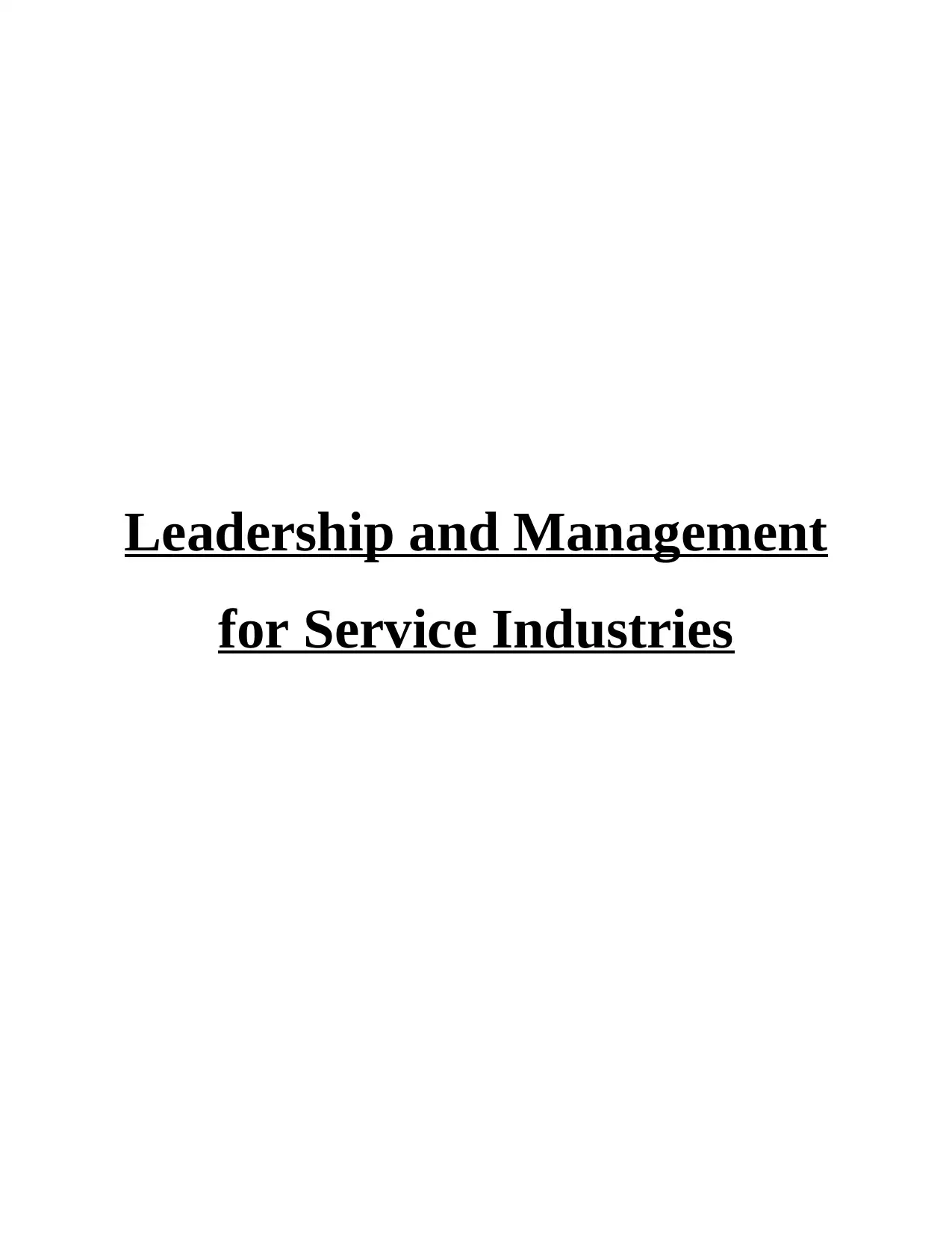
Leadership and Management
for Service Industries
for Service Industries
Paraphrase This Document
Need a fresh take? Get an instant paraphrase of this document with our AI Paraphraser
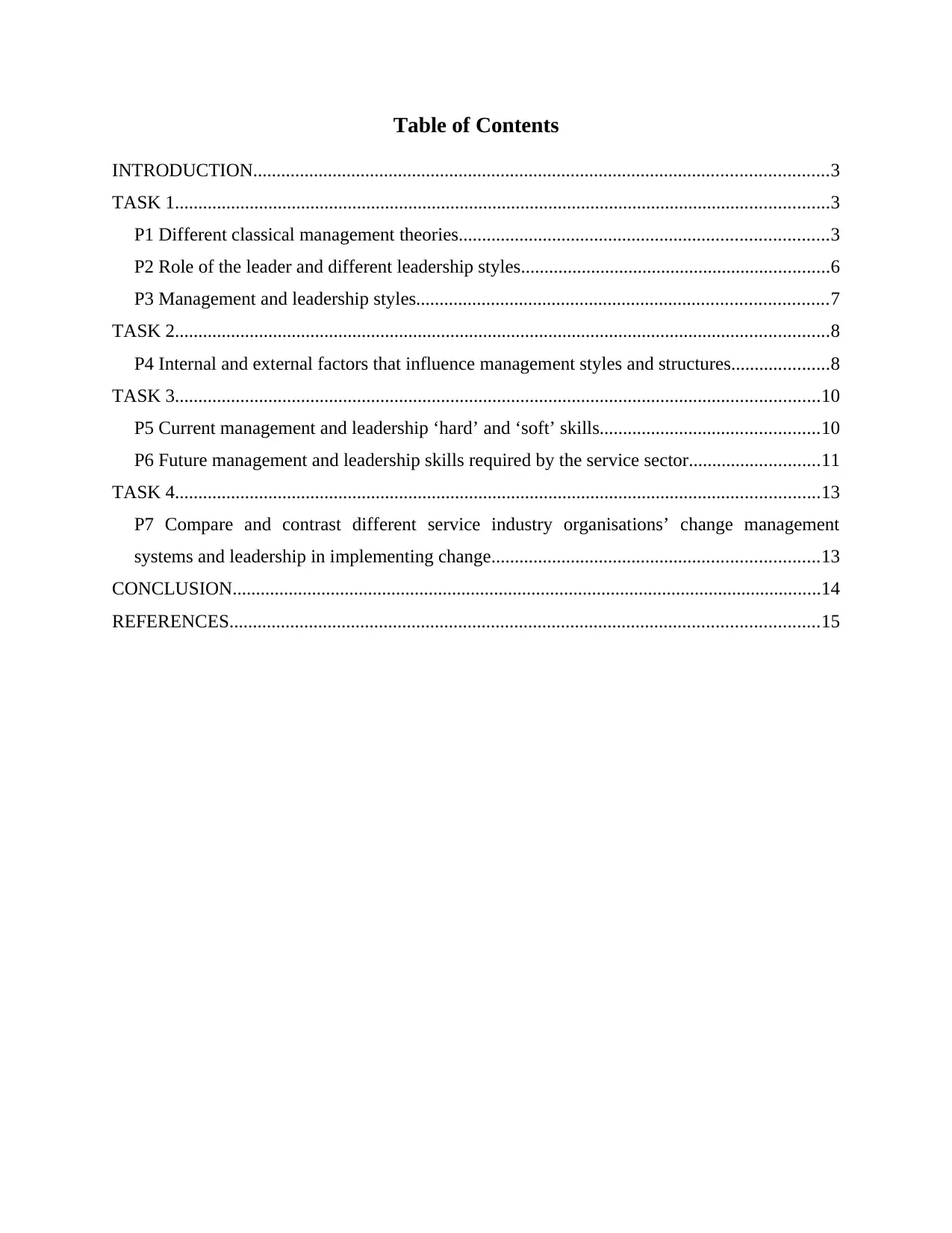
Table of Contents
INTRODUCTION...........................................................................................................................3
TASK 1............................................................................................................................................3
P1 Different classical management theories...............................................................................3
P2 Role of the leader and different leadership styles..................................................................6
P3 Management and leadership styles........................................................................................7
TASK 2............................................................................................................................................8
P4 Internal and external factors that influence management styles and structures.....................8
TASK 3..........................................................................................................................................10
P5 Current management and leadership ‘hard’ and ‘soft’ skills...............................................10
P6 Future management and leadership skills required by the service sector............................11
TASK 4..........................................................................................................................................13
P7 Compare and contrast different service industry organisations’ change management
systems and leadership in implementing change......................................................................13
CONCLUSION..............................................................................................................................14
REFERENCES..............................................................................................................................15
INTRODUCTION...........................................................................................................................3
TASK 1............................................................................................................................................3
P1 Different classical management theories...............................................................................3
P2 Role of the leader and different leadership styles..................................................................6
P3 Management and leadership styles........................................................................................7
TASK 2............................................................................................................................................8
P4 Internal and external factors that influence management styles and structures.....................8
TASK 3..........................................................................................................................................10
P5 Current management and leadership ‘hard’ and ‘soft’ skills...............................................10
P6 Future management and leadership skills required by the service sector............................11
TASK 4..........................................................................................................................................13
P7 Compare and contrast different service industry organisations’ change management
systems and leadership in implementing change......................................................................13
CONCLUSION..............................................................................................................................14
REFERENCES..............................................................................................................................15
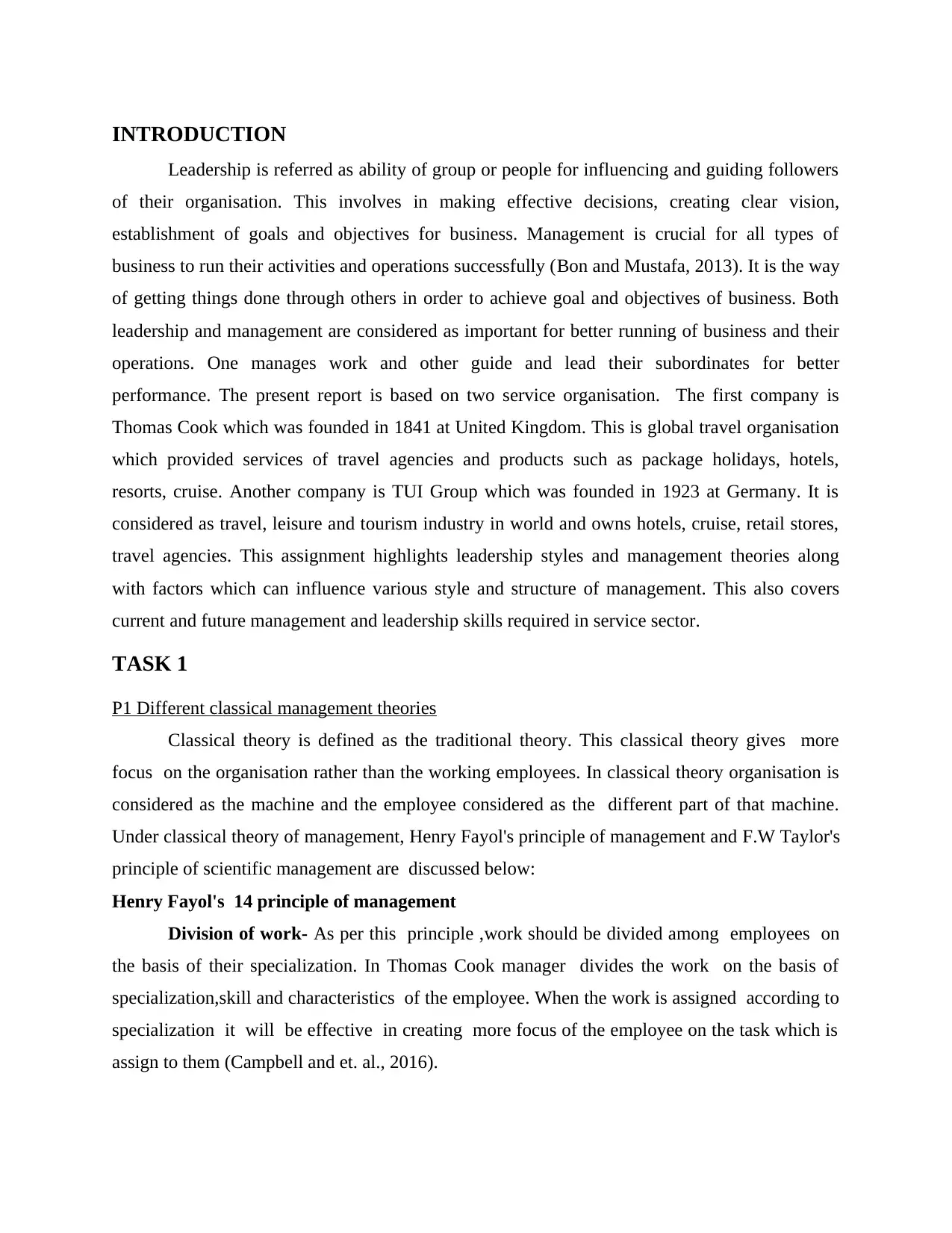
INTRODUCTION
Leadership is referred as ability of group or people for influencing and guiding followers
of their organisation. This involves in making effective decisions, creating clear vision,
establishment of goals and objectives for business. Management is crucial for all types of
business to run their activities and operations successfully (Bon and Mustafa, 2013). It is the way
of getting things done through others in order to achieve goal and objectives of business. Both
leadership and management are considered as important for better running of business and their
operations. One manages work and other guide and lead their subordinates for better
performance. The present report is based on two service organisation. The first company is
Thomas Cook which was founded in 1841 at United Kingdom. This is global travel organisation
which provided services of travel agencies and products such as package holidays, hotels,
resorts, cruise. Another company is TUI Group which was founded in 1923 at Germany. It is
considered as travel, leisure and tourism industry in world and owns hotels, cruise, retail stores,
travel agencies. This assignment highlights leadership styles and management theories along
with factors which can influence various style and structure of management. This also covers
current and future management and leadership skills required in service sector.
TASK 1
P1 Different classical management theories
Classical theory is defined as the traditional theory. This classical theory gives more
focus on the organisation rather than the working employees. In classical theory organisation is
considered as the machine and the employee considered as the different part of that machine.
Under classical theory of management, Henry Fayol's principle of management and F.W Taylor's
principle of scientific management are discussed below:
Henry Fayol's 14 principle of management
Division of work- As per this principle ,work should be divided among employees on
the basis of their specialization. In Thomas Cook manager divides the work on the basis of
specialization,skill and characteristics of the employee. When the work is assigned according to
specialization it will be effective in creating more focus of the employee on the task which is
assign to them (Campbell and et. al., 2016).
Leadership is referred as ability of group or people for influencing and guiding followers
of their organisation. This involves in making effective decisions, creating clear vision,
establishment of goals and objectives for business. Management is crucial for all types of
business to run their activities and operations successfully (Bon and Mustafa, 2013). It is the way
of getting things done through others in order to achieve goal and objectives of business. Both
leadership and management are considered as important for better running of business and their
operations. One manages work and other guide and lead their subordinates for better
performance. The present report is based on two service organisation. The first company is
Thomas Cook which was founded in 1841 at United Kingdom. This is global travel organisation
which provided services of travel agencies and products such as package holidays, hotels,
resorts, cruise. Another company is TUI Group which was founded in 1923 at Germany. It is
considered as travel, leisure and tourism industry in world and owns hotels, cruise, retail stores,
travel agencies. This assignment highlights leadership styles and management theories along
with factors which can influence various style and structure of management. This also covers
current and future management and leadership skills required in service sector.
TASK 1
P1 Different classical management theories
Classical theory is defined as the traditional theory. This classical theory gives more
focus on the organisation rather than the working employees. In classical theory organisation is
considered as the machine and the employee considered as the different part of that machine.
Under classical theory of management, Henry Fayol's principle of management and F.W Taylor's
principle of scientific management are discussed below:
Henry Fayol's 14 principle of management
Division of work- As per this principle ,work should be divided among employees on
the basis of their specialization. In Thomas Cook manager divides the work on the basis of
specialization,skill and characteristics of the employee. When the work is assigned according to
specialization it will be effective in creating more focus of the employee on the task which is
assign to them (Campbell and et. al., 2016).
⊘ This is a preview!⊘
Do you want full access?
Subscribe today to unlock all pages.

Trusted by 1+ million students worldwide
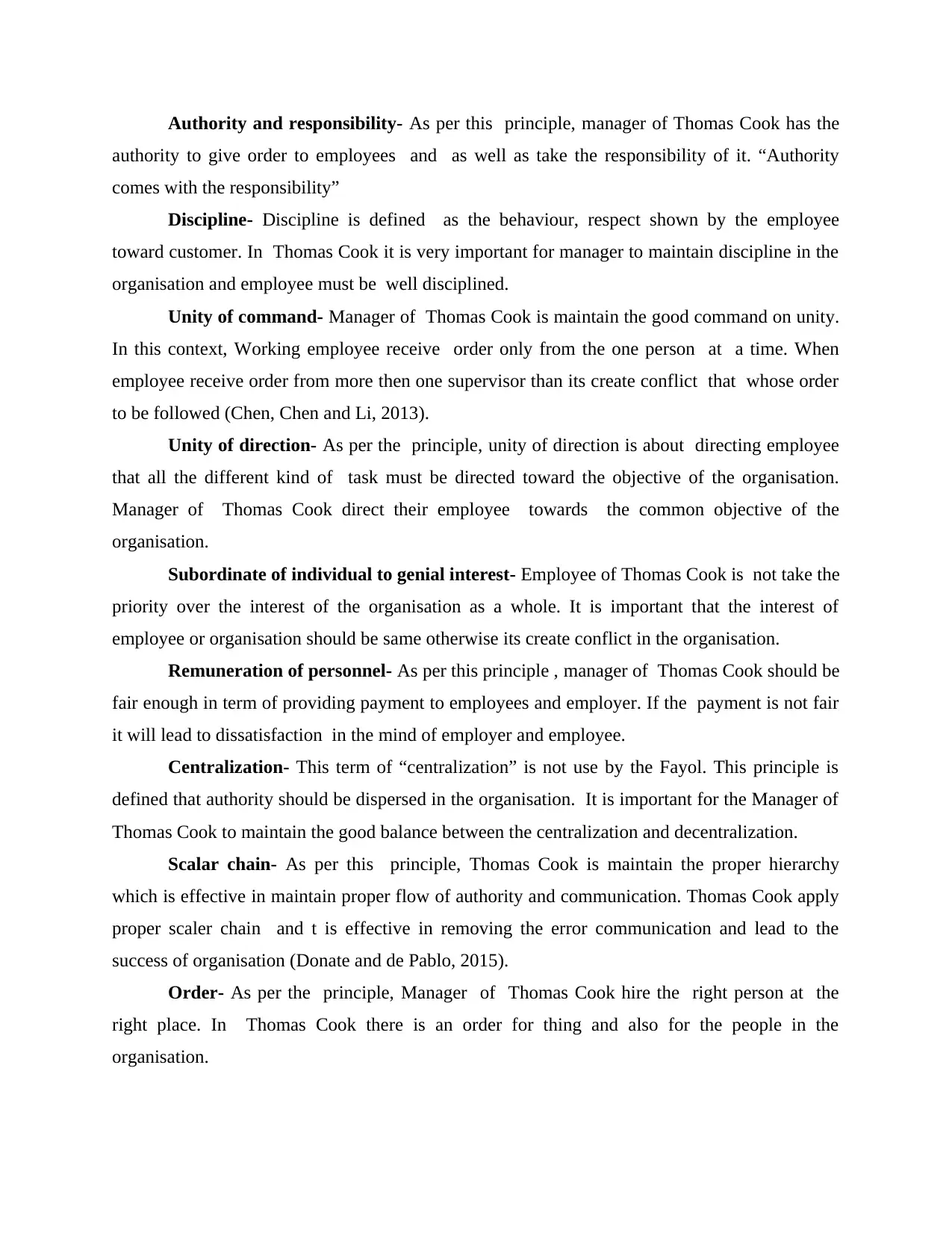
Authority and responsibility- As per this principle, manager of Thomas Cook has the
authority to give order to employees and as well as take the responsibility of it. “Authority
comes with the responsibility”
Discipline- Discipline is defined as the behaviour, respect shown by the employee
toward customer. In Thomas Cook it is very important for manager to maintain discipline in the
organisation and employee must be well disciplined.
Unity of command- Manager of Thomas Cook is maintain the good command on unity.
In this context, Working employee receive order only from the one person at a time. When
employee receive order from more then one supervisor than its create conflict that whose order
to be followed (Chen, Chen and Li, 2013).
Unity of direction- As per the principle, unity of direction is about directing employee
that all the different kind of task must be directed toward the objective of the organisation.
Manager of Thomas Cook direct their employee towards the common objective of the
organisation.
Subordinate of individual to genial interest- Employee of Thomas Cook is not take the
priority over the interest of the organisation as a whole. It is important that the interest of
employee or organisation should be same otherwise its create conflict in the organisation.
Remuneration of personnel- As per this principle , manager of Thomas Cook should be
fair enough in term of providing payment to employees and employer. If the payment is not fair
it will lead to dissatisfaction in the mind of employer and employee.
Centralization- This term of “centralization” is not use by the Fayol. This principle is
defined that authority should be dispersed in the organisation. It is important for the Manager of
Thomas Cook to maintain the good balance between the centralization and decentralization.
Scalar chain- As per this principle, Thomas Cook is maintain the proper hierarchy
which is effective in maintain proper flow of authority and communication. Thomas Cook apply
proper scaler chain and t is effective in removing the error communication and lead to the
success of organisation (Donate and de Pablo, 2015).
Order- As per the principle, Manager of Thomas Cook hire the right person at the
right place. In Thomas Cook there is an order for thing and also for the people in the
organisation.
authority to give order to employees and as well as take the responsibility of it. “Authority
comes with the responsibility”
Discipline- Discipline is defined as the behaviour, respect shown by the employee
toward customer. In Thomas Cook it is very important for manager to maintain discipline in the
organisation and employee must be well disciplined.
Unity of command- Manager of Thomas Cook is maintain the good command on unity.
In this context, Working employee receive order only from the one person at a time. When
employee receive order from more then one supervisor than its create conflict that whose order
to be followed (Chen, Chen and Li, 2013).
Unity of direction- As per the principle, unity of direction is about directing employee
that all the different kind of task must be directed toward the objective of the organisation.
Manager of Thomas Cook direct their employee towards the common objective of the
organisation.
Subordinate of individual to genial interest- Employee of Thomas Cook is not take the
priority over the interest of the organisation as a whole. It is important that the interest of
employee or organisation should be same otherwise its create conflict in the organisation.
Remuneration of personnel- As per this principle , manager of Thomas Cook should be
fair enough in term of providing payment to employees and employer. If the payment is not fair
it will lead to dissatisfaction in the mind of employer and employee.
Centralization- This term of “centralization” is not use by the Fayol. This principle is
defined that authority should be dispersed in the organisation. It is important for the Manager of
Thomas Cook to maintain the good balance between the centralization and decentralization.
Scalar chain- As per this principle, Thomas Cook is maintain the proper hierarchy
which is effective in maintain proper flow of authority and communication. Thomas Cook apply
proper scaler chain and t is effective in removing the error communication and lead to the
success of organisation (Donate and de Pablo, 2015).
Order- As per the principle, Manager of Thomas Cook hire the right person at the
right place. In Thomas Cook there is an order for thing and also for the people in the
organisation.
Paraphrase This Document
Need a fresh take? Get an instant paraphrase of this document with our AI Paraphraser
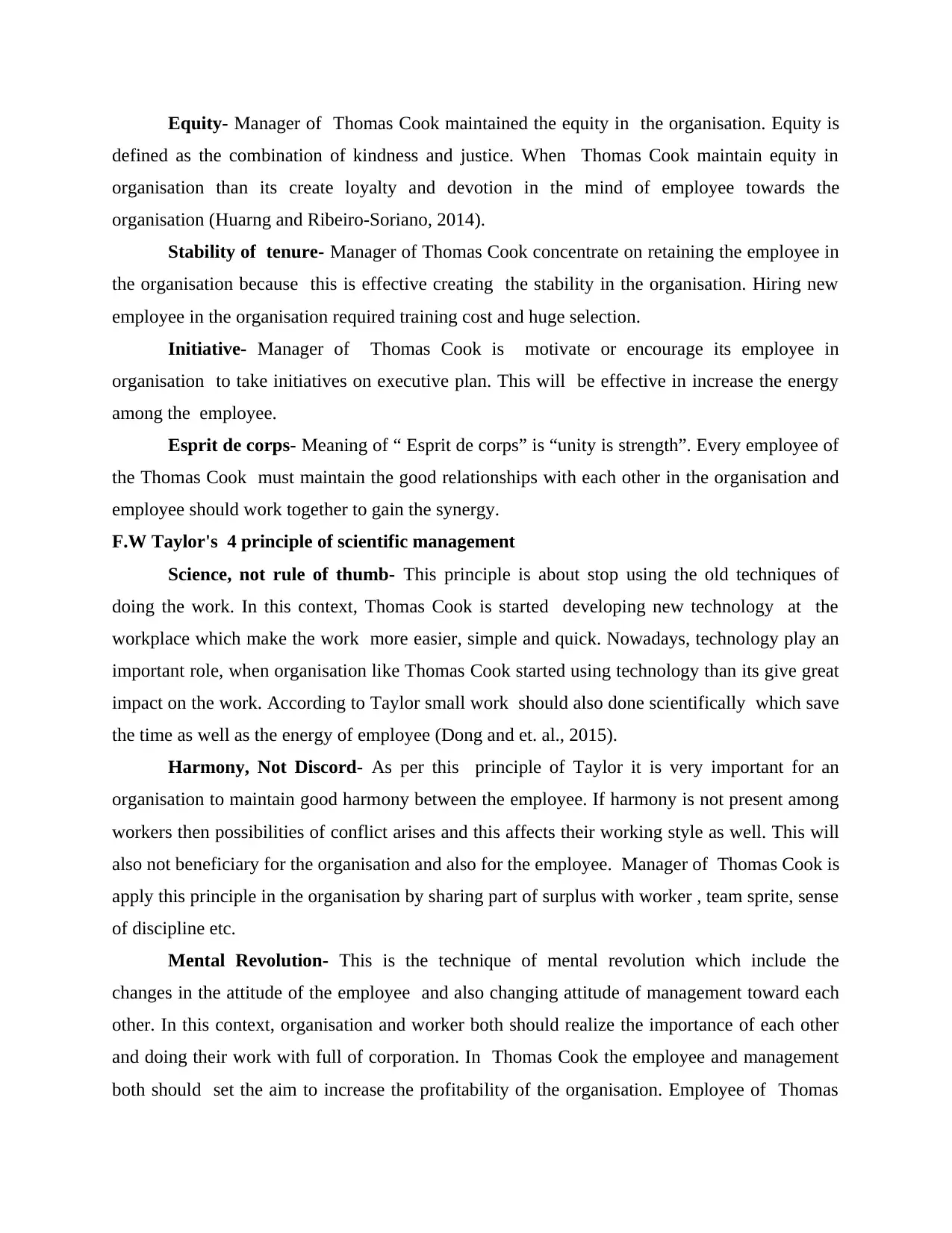
Equity- Manager of Thomas Cook maintained the equity in the organisation. Equity is
defined as the combination of kindness and justice. When Thomas Cook maintain equity in
organisation than its create loyalty and devotion in the mind of employee towards the
organisation (Huarng and Ribeiro-Soriano, 2014).
Stability of tenure- Manager of Thomas Cook concentrate on retaining the employee in
the organisation because this is effective creating the stability in the organisation. Hiring new
employee in the organisation required training cost and huge selection.
Initiative- Manager of Thomas Cook is motivate or encourage its employee in
organisation to take initiatives on executive plan. This will be effective in increase the energy
among the employee.
Esprit de corps- Meaning of “ Esprit de corps” is “unity is strength”. Every employee of
the Thomas Cook must maintain the good relationships with each other in the organisation and
employee should work together to gain the synergy.
F.W Taylor's 4 principle of scientific management
Science, not rule of thumb- This principle is about stop using the old techniques of
doing the work. In this context, Thomas Cook is started developing new technology at the
workplace which make the work more easier, simple and quick. Nowadays, technology play an
important role, when organisation like Thomas Cook started using technology than its give great
impact on the work. According to Taylor small work should also done scientifically which save
the time as well as the energy of employee (Dong and et. al., 2015).
Harmony, Not Discord- As per this principle of Taylor it is very important for an
organisation to maintain good harmony between the employee. If harmony is not present among
workers then possibilities of conflict arises and this affects their working style as well. This will
also not beneficiary for the organisation and also for the employee. Manager of Thomas Cook is
apply this principle in the organisation by sharing part of surplus with worker , team sprite, sense
of discipline etc.
Mental Revolution- This is the technique of mental revolution which include the
changes in the attitude of the employee and also changing attitude of management toward each
other. In this context, organisation and worker both should realize the importance of each other
and doing their work with full of corporation. In Thomas Cook the employee and management
both should set the aim to increase the profitability of the organisation. Employee of Thomas
defined as the combination of kindness and justice. When Thomas Cook maintain equity in
organisation than its create loyalty and devotion in the mind of employee towards the
organisation (Huarng and Ribeiro-Soriano, 2014).
Stability of tenure- Manager of Thomas Cook concentrate on retaining the employee in
the organisation because this is effective creating the stability in the organisation. Hiring new
employee in the organisation required training cost and huge selection.
Initiative- Manager of Thomas Cook is motivate or encourage its employee in
organisation to take initiatives on executive plan. This will be effective in increase the energy
among the employee.
Esprit de corps- Meaning of “ Esprit de corps” is “unity is strength”. Every employee of
the Thomas Cook must maintain the good relationships with each other in the organisation and
employee should work together to gain the synergy.
F.W Taylor's 4 principle of scientific management
Science, not rule of thumb- This principle is about stop using the old techniques of
doing the work. In this context, Thomas Cook is started developing new technology at the
workplace which make the work more easier, simple and quick. Nowadays, technology play an
important role, when organisation like Thomas Cook started using technology than its give great
impact on the work. According to Taylor small work should also done scientifically which save
the time as well as the energy of employee (Dong and et. al., 2015).
Harmony, Not Discord- As per this principle of Taylor it is very important for an
organisation to maintain good harmony between the employee. If harmony is not present among
workers then possibilities of conflict arises and this affects their working style as well. This will
also not beneficiary for the organisation and also for the employee. Manager of Thomas Cook is
apply this principle in the organisation by sharing part of surplus with worker , team sprite, sense
of discipline etc.
Mental Revolution- This is the technique of mental revolution which include the
changes in the attitude of the employee and also changing attitude of management toward each
other. In this context, organisation and worker both should realize the importance of each other
and doing their work with full of corporation. In Thomas Cook the employee and management
both should set the aim to increase the profitability of the organisation. Employee of Thomas
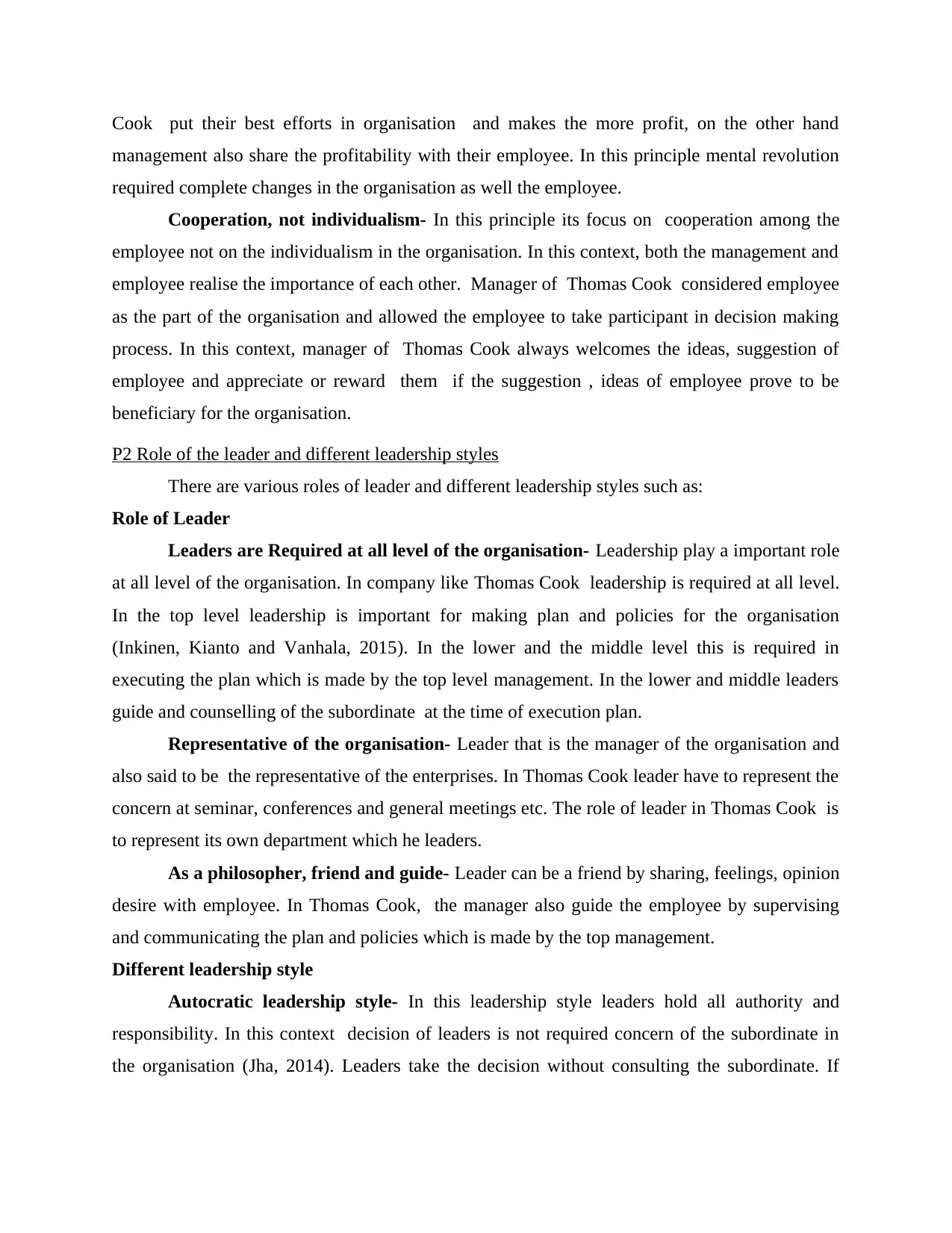
Cook put their best efforts in organisation and makes the more profit, on the other hand
management also share the profitability with their employee. In this principle mental revolution
required complete changes in the organisation as well the employee.
Cooperation, not individualism- In this principle its focus on cooperation among the
employee not on the individualism in the organisation. In this context, both the management and
employee realise the importance of each other. Manager of Thomas Cook considered employee
as the part of the organisation and allowed the employee to take participant in decision making
process. In this context, manager of Thomas Cook always welcomes the ideas, suggestion of
employee and appreciate or reward them if the suggestion , ideas of employee prove to be
beneficiary for the organisation.
P2 Role of the leader and different leadership styles
There are various roles of leader and different leadership styles such as:
Role of Leader
Leaders are Required at all level of the organisation- Leadership play a important role
at all level of the organisation. In company like Thomas Cook leadership is required at all level.
In the top level leadership is important for making plan and policies for the organisation
(Inkinen, Kianto and Vanhala, 2015). In the lower and the middle level this is required in
executing the plan which is made by the top level management. In the lower and middle leaders
guide and counselling of the subordinate at the time of execution plan.
Representative of the organisation- Leader that is the manager of the organisation and
also said to be the representative of the enterprises. In Thomas Cook leader have to represent the
concern at seminar, conferences and general meetings etc. The role of leader in Thomas Cook is
to represent its own department which he leaders.
As a philosopher, friend and guide- Leader can be a friend by sharing, feelings, opinion
desire with employee. In Thomas Cook, the manager also guide the employee by supervising
and communicating the plan and policies which is made by the top management.
Different leadership style
Autocratic leadership style- In this leadership style leaders hold all authority and
responsibility. In this context decision of leaders is not required concern of the subordinate in
the organisation (Jha, 2014). Leaders take the decision without consulting the subordinate. If
management also share the profitability with their employee. In this principle mental revolution
required complete changes in the organisation as well the employee.
Cooperation, not individualism- In this principle its focus on cooperation among the
employee not on the individualism in the organisation. In this context, both the management and
employee realise the importance of each other. Manager of Thomas Cook considered employee
as the part of the organisation and allowed the employee to take participant in decision making
process. In this context, manager of Thomas Cook always welcomes the ideas, suggestion of
employee and appreciate or reward them if the suggestion , ideas of employee prove to be
beneficiary for the organisation.
P2 Role of the leader and different leadership styles
There are various roles of leader and different leadership styles such as:
Role of Leader
Leaders are Required at all level of the organisation- Leadership play a important role
at all level of the organisation. In company like Thomas Cook leadership is required at all level.
In the top level leadership is important for making plan and policies for the organisation
(Inkinen, Kianto and Vanhala, 2015). In the lower and the middle level this is required in
executing the plan which is made by the top level management. In the lower and middle leaders
guide and counselling of the subordinate at the time of execution plan.
Representative of the organisation- Leader that is the manager of the organisation and
also said to be the representative of the enterprises. In Thomas Cook leader have to represent the
concern at seminar, conferences and general meetings etc. The role of leader in Thomas Cook is
to represent its own department which he leaders.
As a philosopher, friend and guide- Leader can be a friend by sharing, feelings, opinion
desire with employee. In Thomas Cook, the manager also guide the employee by supervising
and communicating the plan and policies which is made by the top management.
Different leadership style
Autocratic leadership style- In this leadership style leaders hold all authority and
responsibility. In this context decision of leaders is not required concern of the subordinate in
the organisation (Jha, 2014). Leaders take the decision without consulting the subordinate. If
⊘ This is a preview!⊘
Do you want full access?
Subscribe today to unlock all pages.

Trusted by 1+ million students worldwide
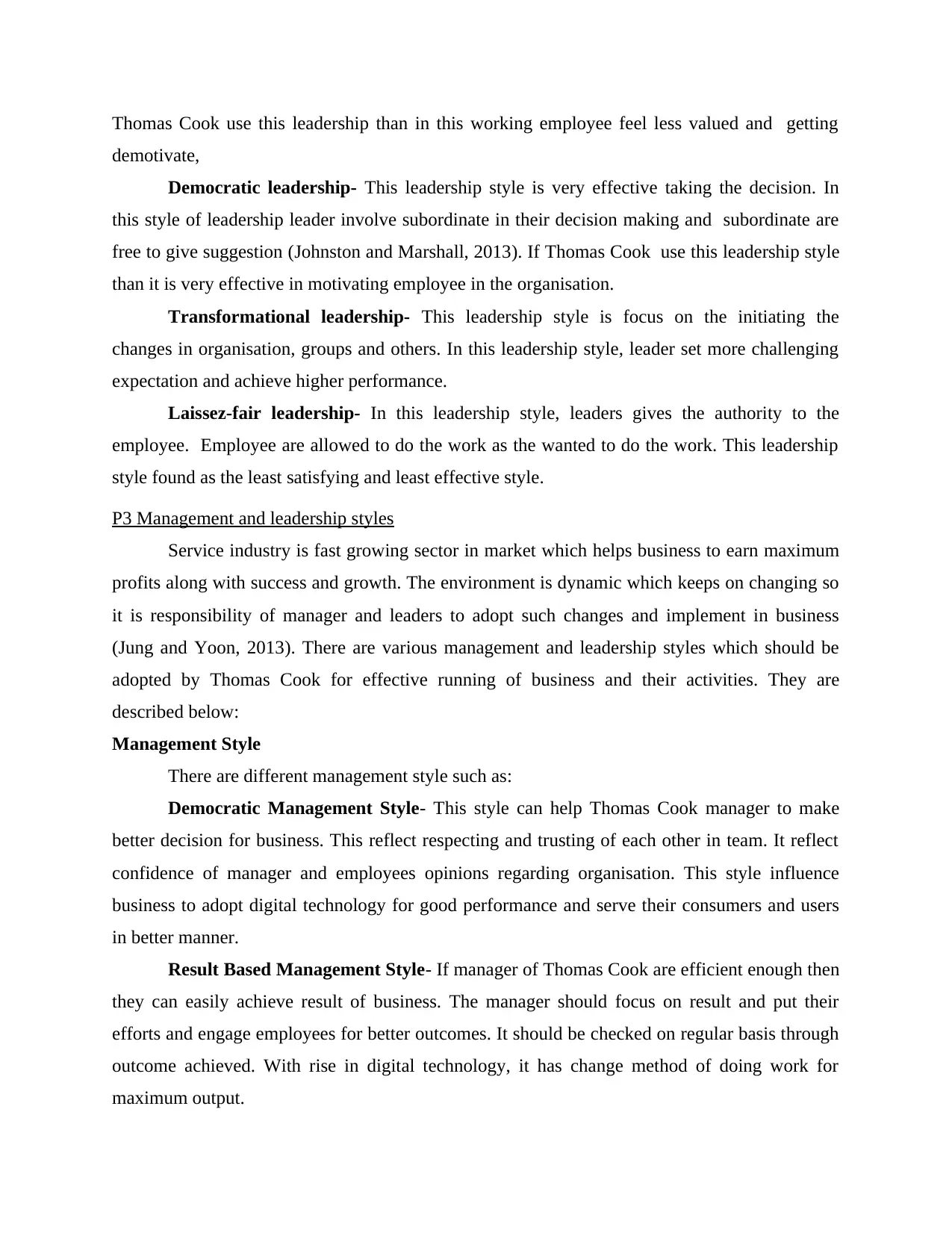
Thomas Cook use this leadership than in this working employee feel less valued and getting
demotivate,
Democratic leadership- This leadership style is very effective taking the decision. In
this style of leadership leader involve subordinate in their decision making and subordinate are
free to give suggestion (Johnston and Marshall, 2013). If Thomas Cook use this leadership style
than it is very effective in motivating employee in the organisation.
Transformational leadership- This leadership style is focus on the initiating the
changes in organisation, groups and others. In this leadership style, leader set more challenging
expectation and achieve higher performance.
Laissez-fair leadership- In this leadership style, leaders gives the authority to the
employee. Employee are allowed to do the work as the wanted to do the work. This leadership
style found as the least satisfying and least effective style.
P3 Management and leadership styles
Service industry is fast growing sector in market which helps business to earn maximum
profits along with success and growth. The environment is dynamic which keeps on changing so
it is responsibility of manager and leaders to adopt such changes and implement in business
(Jung and Yoon, 2013). There are various management and leadership styles which should be
adopted by Thomas Cook for effective running of business and their activities. They are
described below:
Management Style
There are different management style such as:
Democratic Management Style- This style can help Thomas Cook manager to make
better decision for business. This reflect respecting and trusting of each other in team. It reflect
confidence of manager and employees opinions regarding organisation. This style influence
business to adopt digital technology for good performance and serve their consumers and users
in better manner.
Result Based Management Style- If manager of Thomas Cook are efficient enough then
they can easily achieve result of business. The manager should focus on result and put their
efforts and engage employees for better outcomes. It should be checked on regular basis through
outcome achieved. With rise in digital technology, it has change method of doing work for
maximum output.
demotivate,
Democratic leadership- This leadership style is very effective taking the decision. In
this style of leadership leader involve subordinate in their decision making and subordinate are
free to give suggestion (Johnston and Marshall, 2013). If Thomas Cook use this leadership style
than it is very effective in motivating employee in the organisation.
Transformational leadership- This leadership style is focus on the initiating the
changes in organisation, groups and others. In this leadership style, leader set more challenging
expectation and achieve higher performance.
Laissez-fair leadership- In this leadership style, leaders gives the authority to the
employee. Employee are allowed to do the work as the wanted to do the work. This leadership
style found as the least satisfying and least effective style.
P3 Management and leadership styles
Service industry is fast growing sector in market which helps business to earn maximum
profits along with success and growth. The environment is dynamic which keeps on changing so
it is responsibility of manager and leaders to adopt such changes and implement in business
(Jung and Yoon, 2013). There are various management and leadership styles which should be
adopted by Thomas Cook for effective running of business and their activities. They are
described below:
Management Style
There are different management style such as:
Democratic Management Style- This style can help Thomas Cook manager to make
better decision for business. This reflect respecting and trusting of each other in team. It reflect
confidence of manager and employees opinions regarding organisation. This style influence
business to adopt digital technology for good performance and serve their consumers and users
in better manner.
Result Based Management Style- If manager of Thomas Cook are efficient enough then
they can easily achieve result of business. The manager should focus on result and put their
efforts and engage employees for better outcomes. It should be checked on regular basis through
outcome achieved. With rise in digital technology, it has change method of doing work for
maximum output.
Paraphrase This Document
Need a fresh take? Get an instant paraphrase of this document with our AI Paraphraser
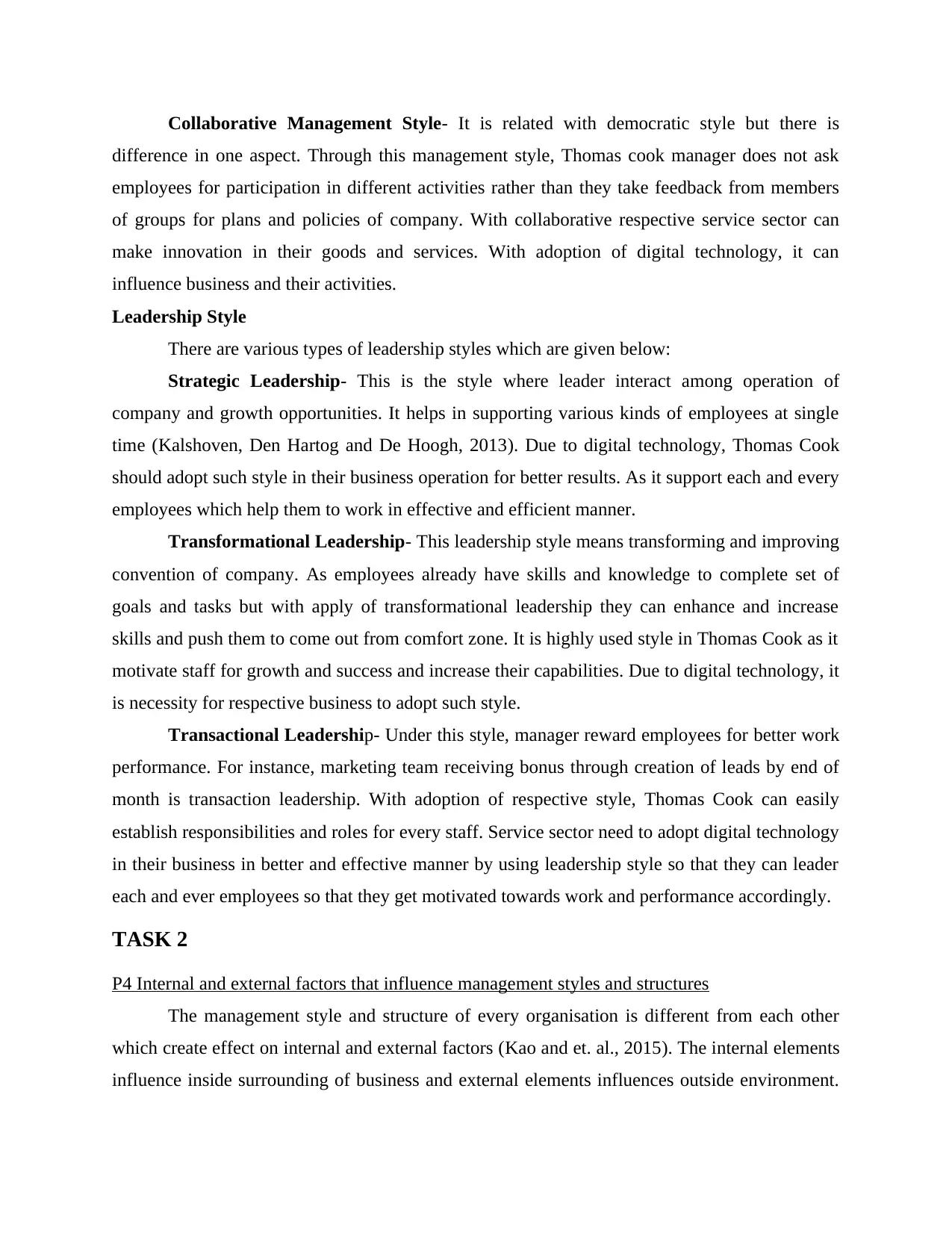
Collaborative Management Style- It is related with democratic style but there is
difference in one aspect. Through this management style, Thomas cook manager does not ask
employees for participation in different activities rather than they take feedback from members
of groups for plans and policies of company. With collaborative respective service sector can
make innovation in their goods and services. With adoption of digital technology, it can
influence business and their activities.
Leadership Style
There are various types of leadership styles which are given below:
Strategic Leadership- This is the style where leader interact among operation of
company and growth opportunities. It helps in supporting various kinds of employees at single
time (Kalshoven, Den Hartog and De Hoogh, 2013). Due to digital technology, Thomas Cook
should adopt such style in their business operation for better results. As it support each and every
employees which help them to work in effective and efficient manner.
Transformational Leadership- This leadership style means transforming and improving
convention of company. As employees already have skills and knowledge to complete set of
goals and tasks but with apply of transformational leadership they can enhance and increase
skills and push them to come out from comfort zone. It is highly used style in Thomas Cook as it
motivate staff for growth and success and increase their capabilities. Due to digital technology, it
is necessity for respective business to adopt such style.
Transactional Leadership- Under this style, manager reward employees for better work
performance. For instance, marketing team receiving bonus through creation of leads by end of
month is transaction leadership. With adoption of respective style, Thomas Cook can easily
establish responsibilities and roles for every staff. Service sector need to adopt digital technology
in their business in better and effective manner by using leadership style so that they can leader
each and ever employees so that they get motivated towards work and performance accordingly.
TASK 2
P4 Internal and external factors that influence management styles and structures
The management style and structure of every organisation is different from each other
which create effect on internal and external factors (Kao and et. al., 2015). The internal elements
influence inside surrounding of business and external elements influences outside environment.
difference in one aspect. Through this management style, Thomas cook manager does not ask
employees for participation in different activities rather than they take feedback from members
of groups for plans and policies of company. With collaborative respective service sector can
make innovation in their goods and services. With adoption of digital technology, it can
influence business and their activities.
Leadership Style
There are various types of leadership styles which are given below:
Strategic Leadership- This is the style where leader interact among operation of
company and growth opportunities. It helps in supporting various kinds of employees at single
time (Kalshoven, Den Hartog and De Hoogh, 2013). Due to digital technology, Thomas Cook
should adopt such style in their business operation for better results. As it support each and every
employees which help them to work in effective and efficient manner.
Transformational Leadership- This leadership style means transforming and improving
convention of company. As employees already have skills and knowledge to complete set of
goals and tasks but with apply of transformational leadership they can enhance and increase
skills and push them to come out from comfort zone. It is highly used style in Thomas Cook as it
motivate staff for growth and success and increase their capabilities. Due to digital technology, it
is necessity for respective business to adopt such style.
Transactional Leadership- Under this style, manager reward employees for better work
performance. For instance, marketing team receiving bonus through creation of leads by end of
month is transaction leadership. With adoption of respective style, Thomas Cook can easily
establish responsibilities and roles for every staff. Service sector need to adopt digital technology
in their business in better and effective manner by using leadership style so that they can leader
each and ever employees so that they get motivated towards work and performance accordingly.
TASK 2
P4 Internal and external factors that influence management styles and structures
The management style and structure of every organisation is different from each other
which create effect on internal and external factors (Kao and et. al., 2015). The internal elements
influence inside surrounding of business and external elements influences outside environment.
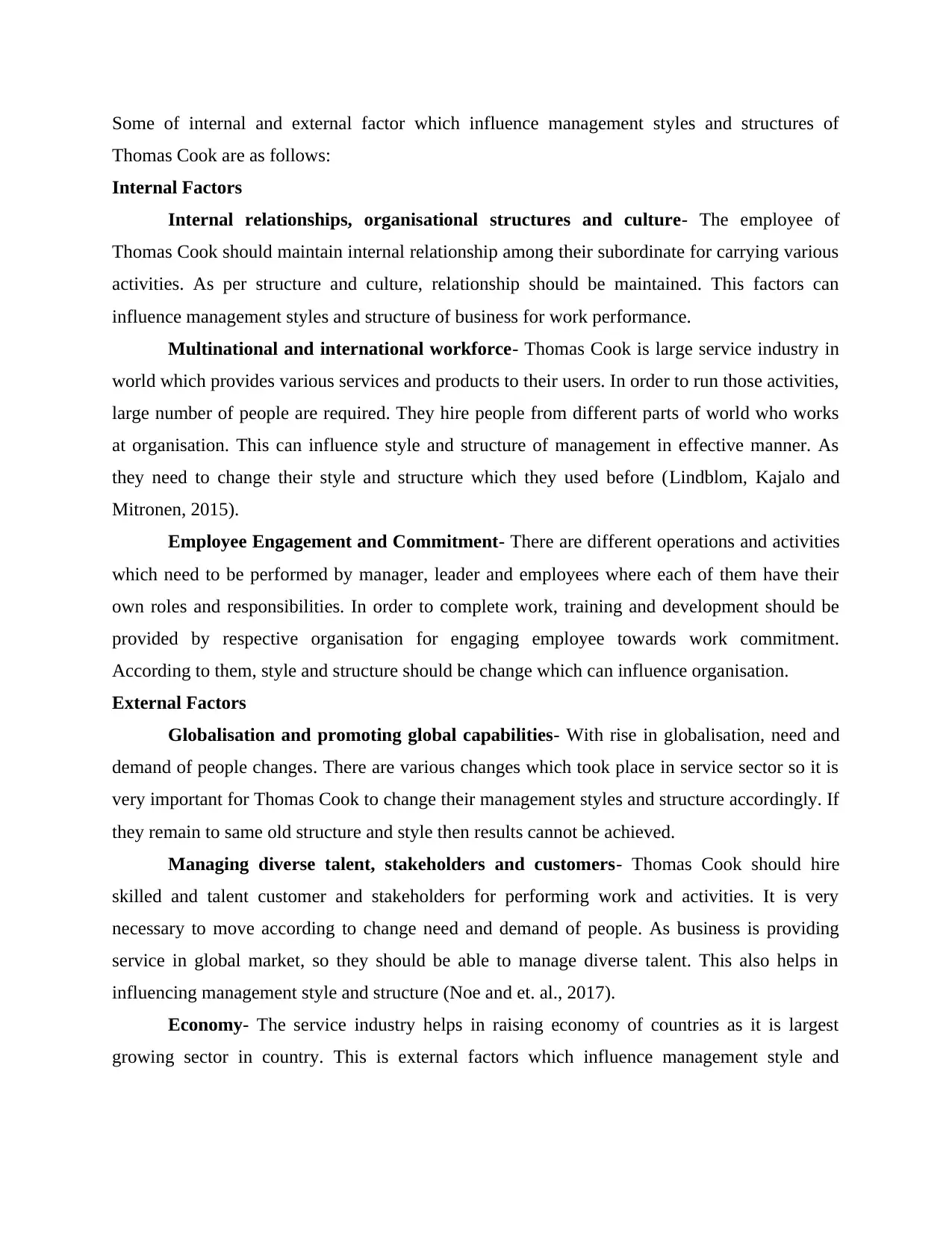
Some of internal and external factor which influence management styles and structures of
Thomas Cook are as follows:
Internal Factors
Internal relationships, organisational structures and culture- The employee of
Thomas Cook should maintain internal relationship among their subordinate for carrying various
activities. As per structure and culture, relationship should be maintained. This factors can
influence management styles and structure of business for work performance.
Multinational and international workforce- Thomas Cook is large service industry in
world which provides various services and products to their users. In order to run those activities,
large number of people are required. They hire people from different parts of world who works
at organisation. This can influence style and structure of management in effective manner. As
they need to change their style and structure which they used before (Lindblom, Kajalo and
Mitronen, 2015).
Employee Engagement and Commitment- There are different operations and activities
which need to be performed by manager, leader and employees where each of them have their
own roles and responsibilities. In order to complete work, training and development should be
provided by respective organisation for engaging employee towards work commitment.
According to them, style and structure should be change which can influence organisation.
External Factors
Globalisation and promoting global capabilities- With rise in globalisation, need and
demand of people changes. There are various changes which took place in service sector so it is
very important for Thomas Cook to change their management styles and structure accordingly. If
they remain to same old structure and style then results cannot be achieved.
Managing diverse talent, stakeholders and customers- Thomas Cook should hire
skilled and talent customer and stakeholders for performing work and activities. It is very
necessary to move according to change need and demand of people. As business is providing
service in global market, so they should be able to manage diverse talent. This also helps in
influencing management style and structure (Noe and et. al., 2017).
Economy- The service industry helps in raising economy of countries as it is largest
growing sector in country. This is external factors which influence management style and
Thomas Cook are as follows:
Internal Factors
Internal relationships, organisational structures and culture- The employee of
Thomas Cook should maintain internal relationship among their subordinate for carrying various
activities. As per structure and culture, relationship should be maintained. This factors can
influence management styles and structure of business for work performance.
Multinational and international workforce- Thomas Cook is large service industry in
world which provides various services and products to their users. In order to run those activities,
large number of people are required. They hire people from different parts of world who works
at organisation. This can influence style and structure of management in effective manner. As
they need to change their style and structure which they used before (Lindblom, Kajalo and
Mitronen, 2015).
Employee Engagement and Commitment- There are different operations and activities
which need to be performed by manager, leader and employees where each of them have their
own roles and responsibilities. In order to complete work, training and development should be
provided by respective organisation for engaging employee towards work commitment.
According to them, style and structure should be change which can influence organisation.
External Factors
Globalisation and promoting global capabilities- With rise in globalisation, need and
demand of people changes. There are various changes which took place in service sector so it is
very important for Thomas Cook to change their management styles and structure accordingly. If
they remain to same old structure and style then results cannot be achieved.
Managing diverse talent, stakeholders and customers- Thomas Cook should hire
skilled and talent customer and stakeholders for performing work and activities. It is very
necessary to move according to change need and demand of people. As business is providing
service in global market, so they should be able to manage diverse talent. This also helps in
influencing management style and structure (Noe and et. al., 2017).
Economy- The service industry helps in raising economy of countries as it is largest
growing sector in country. This is external factors which influence management style and
⊘ This is a preview!⊘
Do you want full access?
Subscribe today to unlock all pages.

Trusted by 1+ million students worldwide
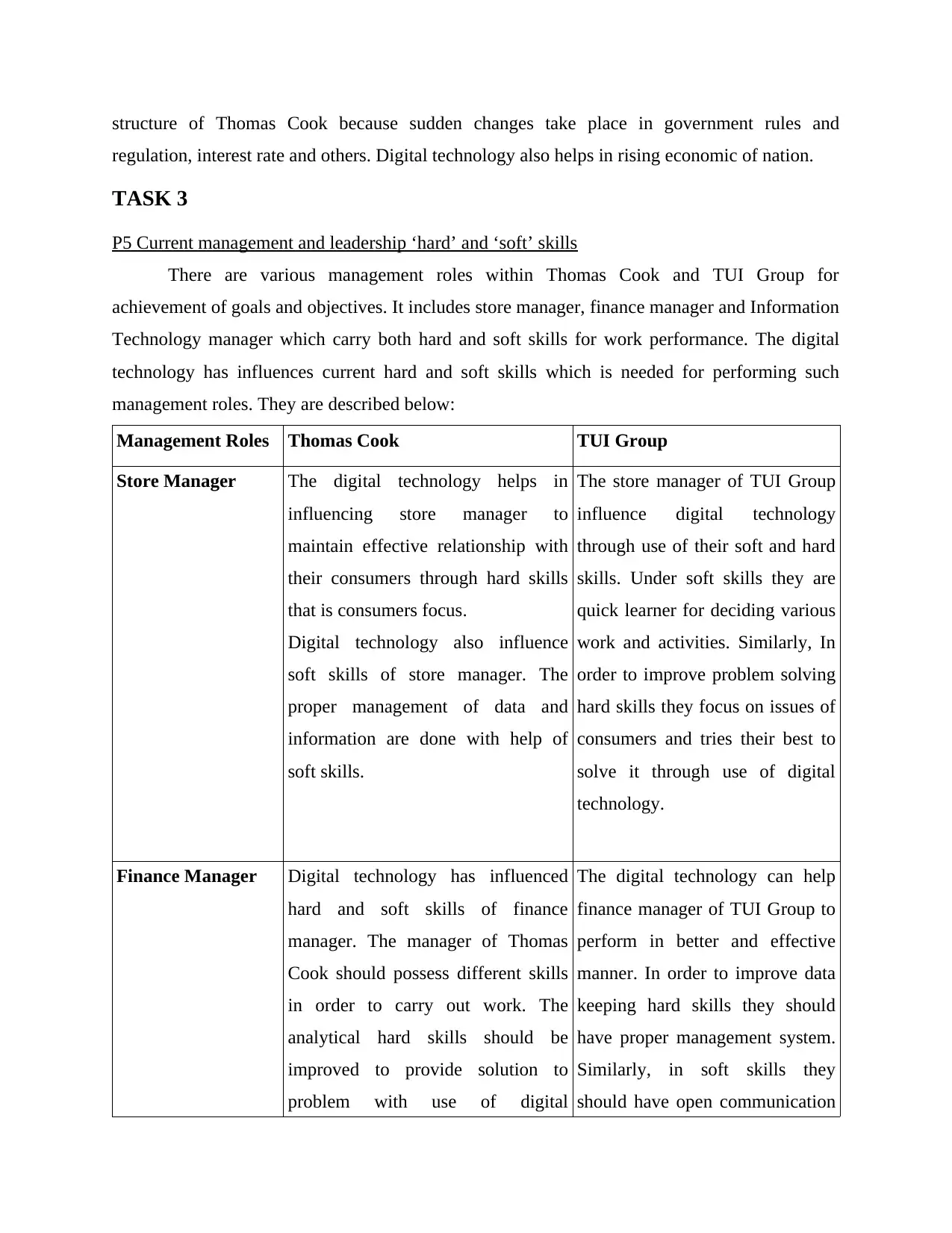
structure of Thomas Cook because sudden changes take place in government rules and
regulation, interest rate and others. Digital technology also helps in rising economic of nation.
TASK 3
P5 Current management and leadership ‘hard’ and ‘soft’ skills
There are various management roles within Thomas Cook and TUI Group for
achievement of goals and objectives. It includes store manager, finance manager and Information
Technology manager which carry both hard and soft skills for work performance. The digital
technology has influences current hard and soft skills which is needed for performing such
management roles. They are described below:
Management Roles Thomas Cook TUI Group
Store Manager The digital technology helps in
influencing store manager to
maintain effective relationship with
their consumers through hard skills
that is consumers focus.
Digital technology also influence
soft skills of store manager. The
proper management of data and
information are done with help of
soft skills.
The store manager of TUI Group
influence digital technology
through use of their soft and hard
skills. Under soft skills they are
quick learner for deciding various
work and activities. Similarly, In
order to improve problem solving
hard skills they focus on issues of
consumers and tries their best to
solve it through use of digital
technology.
Finance Manager Digital technology has influenced
hard and soft skills of finance
manager. The manager of Thomas
Cook should possess different skills
in order to carry out work. The
analytical hard skills should be
improved to provide solution to
problem with use of digital
The digital technology can help
finance manager of TUI Group to
perform in better and effective
manner. In order to improve data
keeping hard skills they should
have proper management system.
Similarly, in soft skills they
should have open communication
regulation, interest rate and others. Digital technology also helps in rising economic of nation.
TASK 3
P5 Current management and leadership ‘hard’ and ‘soft’ skills
There are various management roles within Thomas Cook and TUI Group for
achievement of goals and objectives. It includes store manager, finance manager and Information
Technology manager which carry both hard and soft skills for work performance. The digital
technology has influences current hard and soft skills which is needed for performing such
management roles. They are described below:
Management Roles Thomas Cook TUI Group
Store Manager The digital technology helps in
influencing store manager to
maintain effective relationship with
their consumers through hard skills
that is consumers focus.
Digital technology also influence
soft skills of store manager. The
proper management of data and
information are done with help of
soft skills.
The store manager of TUI Group
influence digital technology
through use of their soft and hard
skills. Under soft skills they are
quick learner for deciding various
work and activities. Similarly, In
order to improve problem solving
hard skills they focus on issues of
consumers and tries their best to
solve it through use of digital
technology.
Finance Manager Digital technology has influenced
hard and soft skills of finance
manager. The manager of Thomas
Cook should possess different skills
in order to carry out work. The
analytical hard skills should be
improved to provide solution to
problem with use of digital
The digital technology can help
finance manager of TUI Group to
perform in better and effective
manner. In order to improve data
keeping hard skills they should
have proper management system.
Similarly, in soft skills they
should have open communication
Paraphrase This Document
Need a fresh take? Get an instant paraphrase of this document with our AI Paraphraser
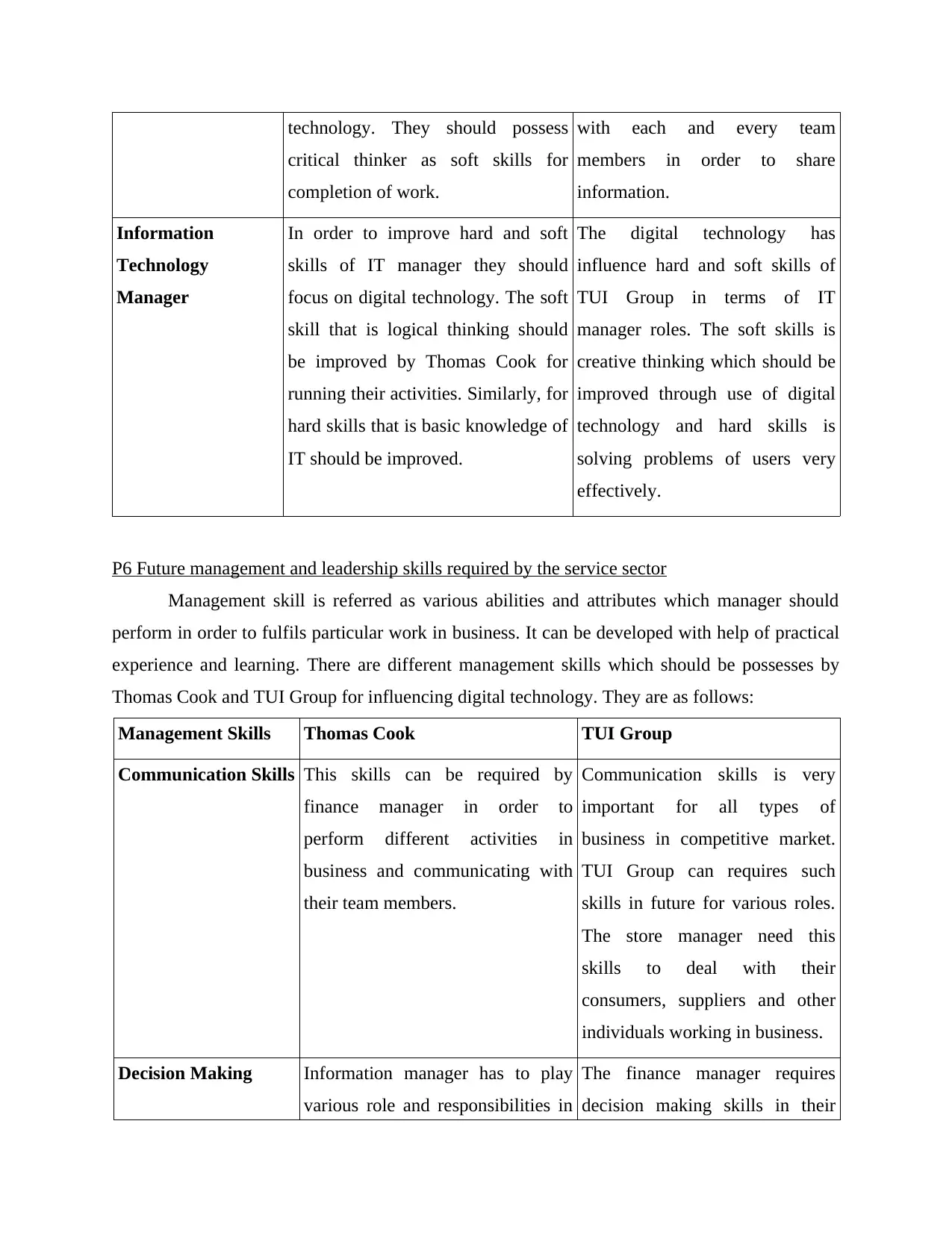
technology. They should possess
critical thinker as soft skills for
completion of work.
with each and every team
members in order to share
information.
Information
Technology
Manager
In order to improve hard and soft
skills of IT manager they should
focus on digital technology. The soft
skill that is logical thinking should
be improved by Thomas Cook for
running their activities. Similarly, for
hard skills that is basic knowledge of
IT should be improved.
The digital technology has
influence hard and soft skills of
TUI Group in terms of IT
manager roles. The soft skills is
creative thinking which should be
improved through use of digital
technology and hard skills is
solving problems of users very
effectively.
P6 Future management and leadership skills required by the service sector
Management skill is referred as various abilities and attributes which manager should
perform in order to fulfils particular work in business. It can be developed with help of practical
experience and learning. There are different management skills which should be possesses by
Thomas Cook and TUI Group for influencing digital technology. They are as follows:
Management Skills Thomas Cook TUI Group
Communication Skills This skills can be required by
finance manager in order to
perform different activities in
business and communicating with
their team members.
Communication skills is very
important for all types of
business in competitive market.
TUI Group can requires such
skills in future for various roles.
The store manager need this
skills to deal with their
consumers, suppliers and other
individuals working in business.
Decision Making Information manager has to play
various role and responsibilities in
The finance manager requires
decision making skills in their
critical thinker as soft skills for
completion of work.
with each and every team
members in order to share
information.
Information
Technology
Manager
In order to improve hard and soft
skills of IT manager they should
focus on digital technology. The soft
skill that is logical thinking should
be improved by Thomas Cook for
running their activities. Similarly, for
hard skills that is basic knowledge of
IT should be improved.
The digital technology has
influence hard and soft skills of
TUI Group in terms of IT
manager roles. The soft skills is
creative thinking which should be
improved through use of digital
technology and hard skills is
solving problems of users very
effectively.
P6 Future management and leadership skills required by the service sector
Management skill is referred as various abilities and attributes which manager should
perform in order to fulfils particular work in business. It can be developed with help of practical
experience and learning. There are different management skills which should be possesses by
Thomas Cook and TUI Group for influencing digital technology. They are as follows:
Management Skills Thomas Cook TUI Group
Communication Skills This skills can be required by
finance manager in order to
perform different activities in
business and communicating with
their team members.
Communication skills is very
important for all types of
business in competitive market.
TUI Group can requires such
skills in future for various roles.
The store manager need this
skills to deal with their
consumers, suppliers and other
individuals working in business.
Decision Making Information manager has to play
various role and responsibilities in
The finance manager requires
decision making skills in their
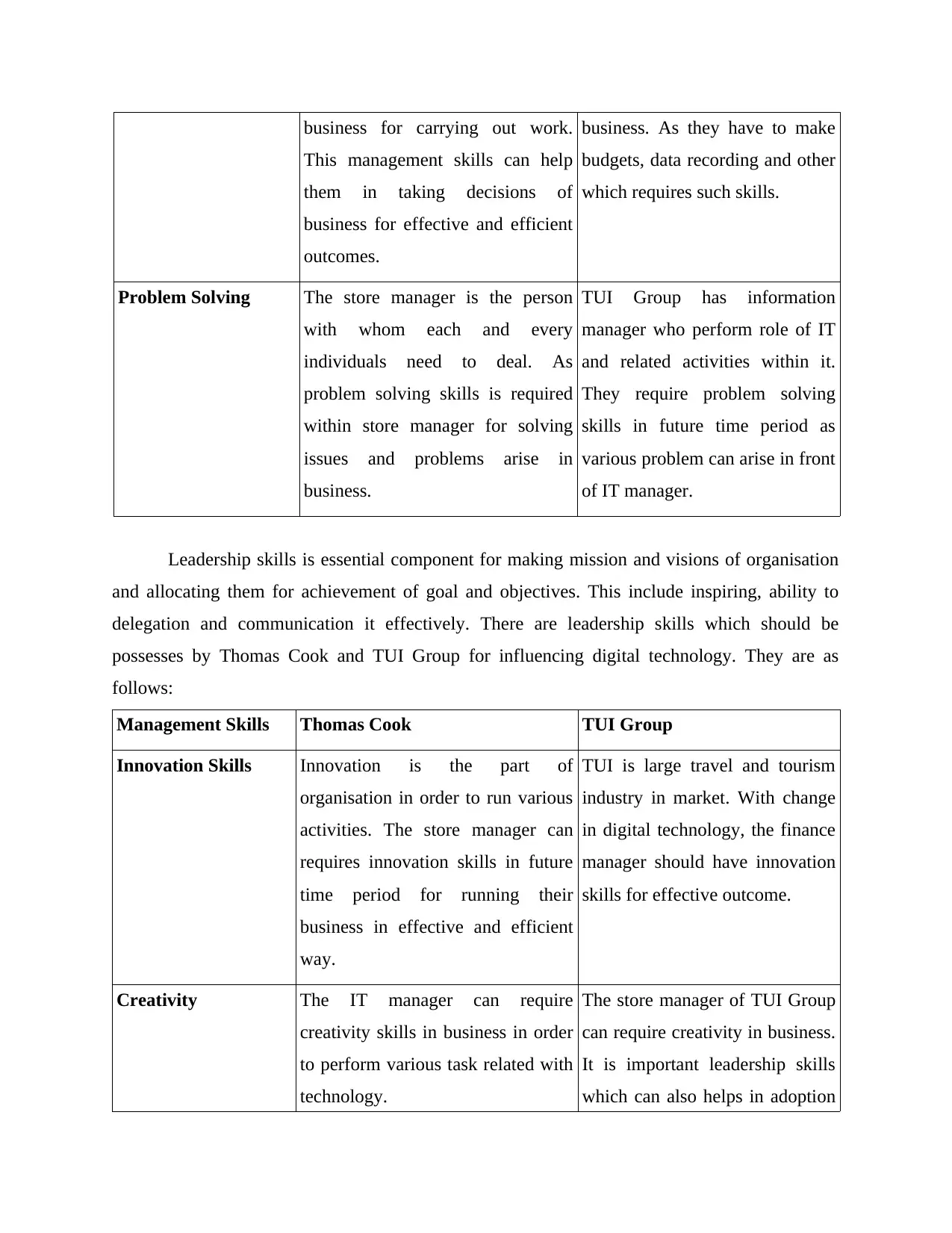
business for carrying out work.
This management skills can help
them in taking decisions of
business for effective and efficient
outcomes.
business. As they have to make
budgets, data recording and other
which requires such skills.
Problem Solving The store manager is the person
with whom each and every
individuals need to deal. As
problem solving skills is required
within store manager for solving
issues and problems arise in
business.
TUI Group has information
manager who perform role of IT
and related activities within it.
They require problem solving
skills in future time period as
various problem can arise in front
of IT manager.
Leadership skills is essential component for making mission and visions of organisation
and allocating them for achievement of goal and objectives. This include inspiring, ability to
delegation and communication it effectively. There are leadership skills which should be
possesses by Thomas Cook and TUI Group for influencing digital technology. They are as
follows:
Management Skills Thomas Cook TUI Group
Innovation Skills Innovation is the part of
organisation in order to run various
activities. The store manager can
requires innovation skills in future
time period for running their
business in effective and efficient
way.
TUI is large travel and tourism
industry in market. With change
in digital technology, the finance
manager should have innovation
skills for effective outcome.
Creativity The IT manager can require
creativity skills in business in order
to perform various task related with
technology.
The store manager of TUI Group
can require creativity in business.
It is important leadership skills
which can also helps in adoption
This management skills can help
them in taking decisions of
business for effective and efficient
outcomes.
business. As they have to make
budgets, data recording and other
which requires such skills.
Problem Solving The store manager is the person
with whom each and every
individuals need to deal. As
problem solving skills is required
within store manager for solving
issues and problems arise in
business.
TUI Group has information
manager who perform role of IT
and related activities within it.
They require problem solving
skills in future time period as
various problem can arise in front
of IT manager.
Leadership skills is essential component for making mission and visions of organisation
and allocating them for achievement of goal and objectives. This include inspiring, ability to
delegation and communication it effectively. There are leadership skills which should be
possesses by Thomas Cook and TUI Group for influencing digital technology. They are as
follows:
Management Skills Thomas Cook TUI Group
Innovation Skills Innovation is the part of
organisation in order to run various
activities. The store manager can
requires innovation skills in future
time period for running their
business in effective and efficient
way.
TUI is large travel and tourism
industry in market. With change
in digital technology, the finance
manager should have innovation
skills for effective outcome.
Creativity The IT manager can require
creativity skills in business in order
to perform various task related with
technology.
The store manager of TUI Group
can require creativity in business.
It is important leadership skills
which can also helps in adoption
⊘ This is a preview!⊘
Do you want full access?
Subscribe today to unlock all pages.

Trusted by 1+ million students worldwide
1 out of 16
Related Documents
Your All-in-One AI-Powered Toolkit for Academic Success.
+13062052269
info@desklib.com
Available 24*7 on WhatsApp / Email
![[object Object]](/_next/static/media/star-bottom.7253800d.svg)
Unlock your academic potential
Copyright © 2020–2026 A2Z Services. All Rights Reserved. Developed and managed by ZUCOL.



